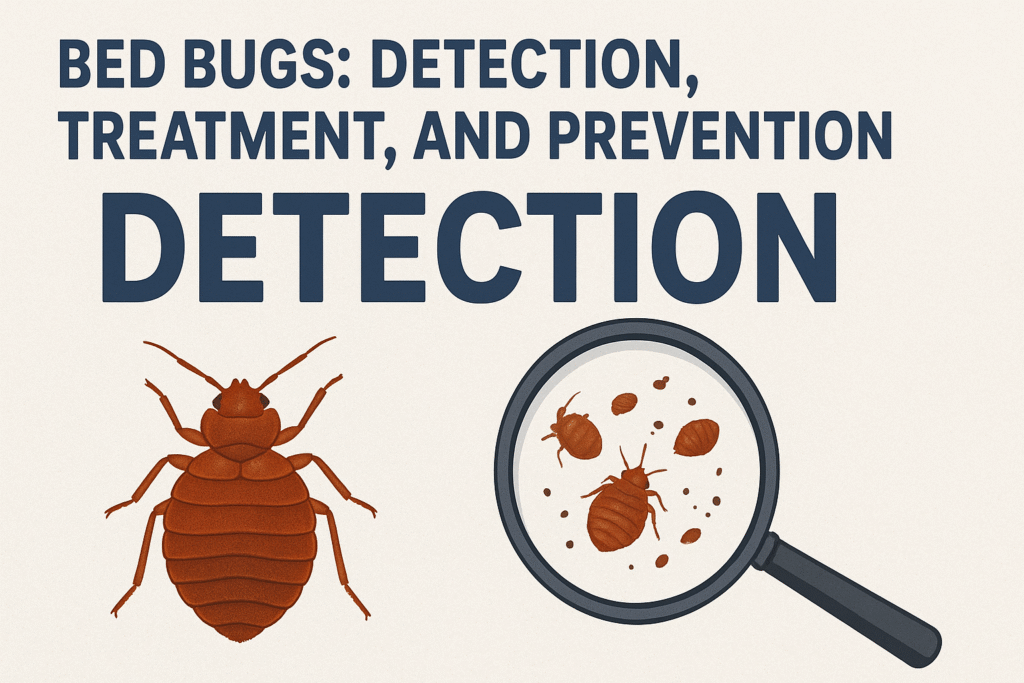Bed Bugs: Detection, Treatment, and Prevention
- Pest_Control

Introduction
Detection of bed bugs is often the most challenging part of dealing with these tiny pests. Bed bugs are small, nocturnal, and experts at hiding in cracks, crevices, and furniture seams. Many homeowners don’t realize they have a problem until they notice itchy bites or see small reddish-brown stains on bedding. Early detection is vital, as a small issue can quickly turn into a large infestation if left unchecked. By learning what to look for and acting fast, you can save both money and stress.
Common Signs of Bed Bugs
Detection usually begins with spotting tell-tale clues such as:
- Small blood stains on sheets or pillowcases.
- Dark or rusty spots of bed bug excrement on mattresses, walls, or furniture.
- Eggs and eggshells, which are tiny and pale yellow in color.
- Shed skins left behind as bed bugs grow.
- A musty odor that often indicates a heavy infestation.
Knowing these signs is key to early detection, and homeowners should routinely check sleeping areas, especially if they travel frequently or live in shared accommodations.
Professional vs. DIY Detection
While many people attempt DIY detection with flashlights and magnifying glasses, professional pest control companies use advanced methods such as specially trained bed bug detection dogs and monitoring devices. Hiring experts often ensures a more thorough inspection and reduces the risk of overlooking hidden nests.
Treatment: Eliminating Bed Bugs Effectively
Once detection confirms their presence, treatment should begin immediately. Bed bugs are notoriously resilient, and ineffective treatment often leads to re-infestation. Professional exterminators use a combination of techniques, including:
- Heat Treatment: Raising room temperatures to levels lethal for bed bugs.
- Insecticides: Applying safe, targeted chemicals in cracks and crevices.
- Vacuuming and Steaming: Physically removing and killing bed bugs and their eggs.
Homeowners attempting DIY treatments often struggle to fully eradicate the pests, as bed bugs can survive in the smallest hiding spots. Therefore, professional help is strongly recommended for long-term success.
Prevention: Keeping Bed Bugs Away for Good
Prevention is just as important as detection and treatment. To reduce the risk of future infestations:
- Inspect second-hand furniture before bringing it home.
- Use protective mattress encasements.
- Regularly wash and heat-dry bedding.
- Reduce clutter, which provides hiding spots for bed bugs.
- Be vigilant after travel by checking luggage and clothing.
By practicing consistent prevention measures, homeowners can keep their environments less appealing to these pests.
Why Early Detection Matters
Delaying detection and treatment allows bed bugs to spread quickly, increasing the difficulty and cost of removal. A few unnoticed bugs can multiply into hundreds within weeks. Early detection ensures that the problem can be addressed before it escalates, making treatment faster, easier, and more affordable.
Conclusion
Detection of bed bugs is the foundation of effective pest management. By staying alert to early signs, investing in professional detection and treatment, and practicing prevention strategies, homeowners can maintain a safe, healthy, and bug-free living space. Bed bugs are persistent, but with the right knowledge and action, they can be successfully controlled and prevented from returning.
Need a professional touch?
Don’t wait until pests take over—stay one step ahead with Blue Diamond’s pest control.



Frequently Asked Questions (FAQs)
How do I know if I have bed bugs?
Look for itchy bite marks, small blood stains on sheets, or tiny dark spots of excrement. Professional detection can confirm their presence with accuracy.
Can I get rid of bed bugs on my own?
DIY methods may reduce the population, but complete elimination is difficult without professional treatment. Bed bugs hide in small spaces and are resistant to many home remedies.
Are bed bugs dangerous?
While bed bugs don’t transmit diseases, their bites can cause itching, allergic reactions, and stress due to loss of sleep.
How long does treatment take?
Depending on the infestation level, treatment can take one or multiple visits. Heat treatments often work in a single session, while chemical treatments may require follow-up.
What’s the best way to prevent bed bugs?
Regular inspections, careful handling of second-hand furniture, and protecting mattresses with encasements are the most effective prevention strategies.
Share this
Book Your
Service In
30 Seconds
- 30 years of experinece
- Served 40,000+ clients across UAE
- Dubai Municipality Approved
- Eco - friendly products safe for All
- Cost Effective
- 24/7 Customer support
Check out our Recent Blogs
The Importance of Regular Pest Inspections for Your Property
Frequently Asked Questions (FAQs) Introduction Importance is at the core of every decision a responsible property owner makes, especially when...
How Technology Is Transforming the Pest Control Industry
Introduction In recent years, technology has reshaped nearly every industry — and pest control is no exception. What was once...



